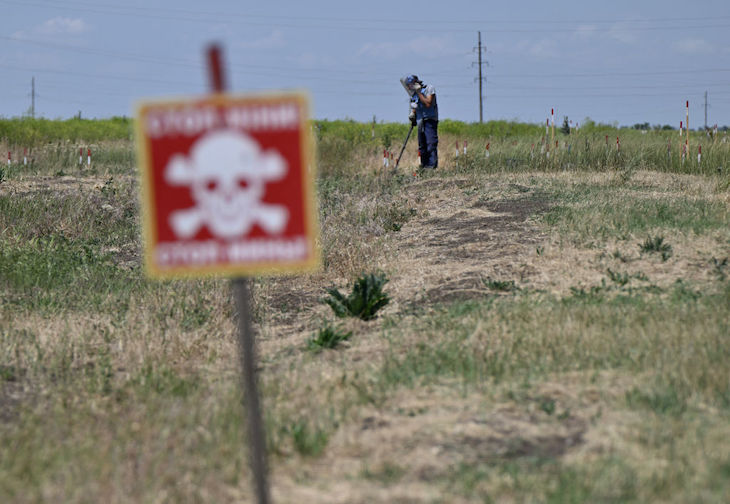There are few better symbols of Europe’s military fecklessness during the brief era of relative peace that followed the end of the Cold War than the 1997 Ottawa Treaty, which banned the use of anti-personnel landmines by its signatories. The same is true of the 2008 Convention on Cluster Munitions (CCM), which outlawed cluster munitions. This was championed by Gordon Brown, despite the strong opposition of the British armed forces.
The return of war to Europe has focused minds
It is easy to understand the humanitarian impulses which lay behind both treaties, both of which count the United Kingdom among its signatories. Anti-personnel mines and cluster bomblets can remain unexploded in the field for decades, killing and maiming civilians long after the end of the war for which they were deployed. At a time when the prospect of large-scale warfare between great powers seemed to be receding, it seemed like a relatively costless concession.
Yet the return of war to Europe has focused minds. This month, Poland and the Baltic republics announced their intent to withdraw from the Ottawa Treaty, while Finland is considering pulling out as well. Lithuania has announced its withdrawal from the Convention on Cluster Munitions, and Poland may follow suit (Finland never acceded to the ban on cluster munitions).
These developments were criticised by the Foreign Office, which expressed ‘regret’ at Lithuania’s decision to withdraw from the CCM. But as Policy Exchange argues in a new paper on the two treaties, such misgivings are misplaced. With war on its eastern flank, Western countries simply cannot afford to remain members of treaties such as the Ottawa Treaty and the CCM – at least not if they wish to deter war in the first place, which is the best way to prevent harm to civilians, as Ukraine’s plight has shown.
The truth is that anti-personnel landmines and cluster munitions happen to be extremely efficient weapons. Landmines, which are a defensive weapon par excellence, are a cheap and effective way to limit enemy movement and to shore up defensive positions; cluster munitions, originally developed to be used against enemy infantry, can now be deployed against enemy vehicles over a large area where precision attacks would be impracticable.
In fact, most Nato countries that have signed the CCM still assume that, in the case of a major war breaking out, they would be able to rely on American cluster munitions, despite having taken them out of their national military stockpiles. In an era where European rearmament is finally being seriously discussed, this sort of virtue-signalling freeriding is not tenable.
The efficacy of these weapons also explains why many of the world’s leading military powers have refused to join these treaties. The United States, Russia, China, and India have all refused to sign either the Ottawa Convention or the Convention on Cluster Munitions. Britain and European countries that have signed these treaties are therefore deliberately placing themselves at a disadvantage against Russia, whose numerical advantage in conventional weaponry they will need to offset, one way or another. As Sir Ben Wallace, the former defence secretary, puts it in his foreword to Policy Exchange’s paper: ‘Too many treaties have stopped serving the interests of their signatories – and have instead become tools for our adversaries to use to their advantage.’
It is perfectly legal to withdraw from either treaty, but the withdrawal only takes effect if, six months after having signalled its intent to withdraw, a country is not engaged in an armed conflict. If a signatory to either treaty is the victim of an unprovoked armed attack, it must therefore choose between complying with international law and defending itself.
Ukraine, which has recently acquired landmines to defend itself against Russia, has already been attacked by activists for breaching the terms of the Ottawa Convention. While the desire to prevent harm to civilians is understandable, far greater harm will come out of losing to Russia than from using landmines against Russian soldiers, even though they may cause civilian casualties.
This is an opportunity for Britain to assume the mantle of leadership in European security. It can lead the way in leaving both treaties and provide important support for allies who want to follow suit. War is a cruel thing. It is hard to not be affected by images of civilians maimed by mines and unexploded cluster munitions. But failure to deter further aggression by Russia would have an unimaginably higher price.
Yuan Yi Zhu is a Senior Fellow at Policy Exchange. ‘The Ottawa Treaty and Convention on Cluster Munitions: Can we still afford them?’ is published today and can be read here







Comments